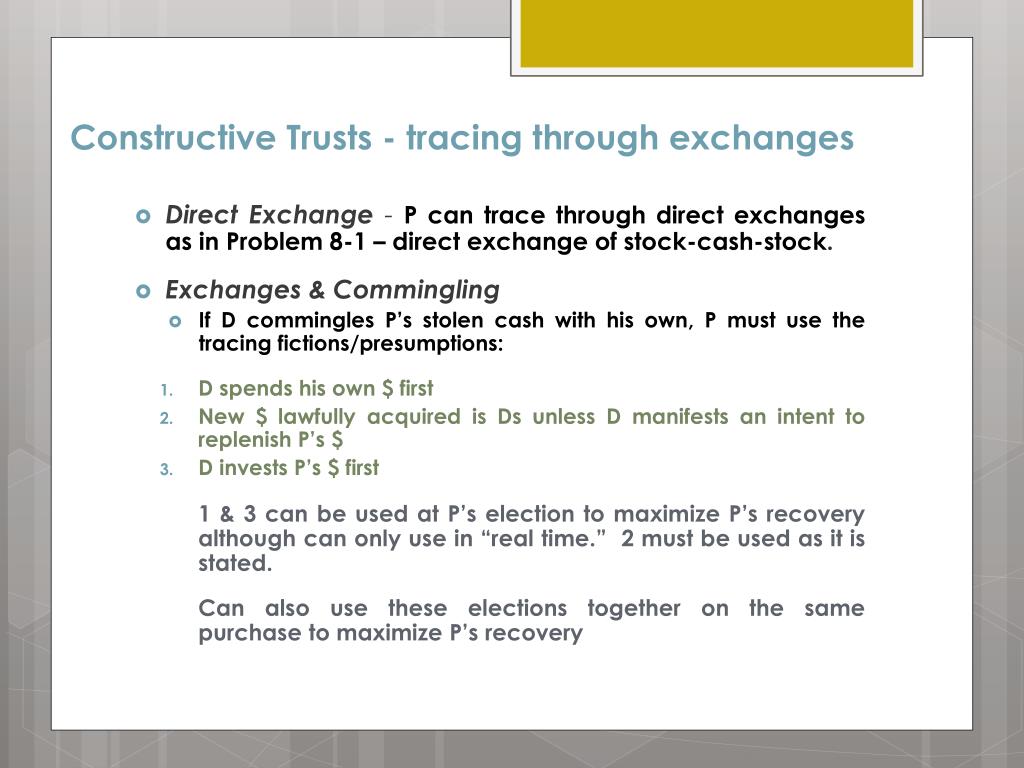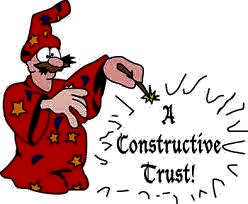An In-Depth Overview to What Is A Constructive Trust in Equity Law
An In-Depth Overview to What Is A Constructive Trust in Equity Law
Blog Article
Checking out How Does a Positive Depend On Operate In Property and Property Disputes
The principle of a constructive count on serves as an important system within home and possession disagreements, dealing with circumstances where one celebration has actually unfairly profited at the expenditure of another. This fair remedy not just seeks to rectify oppressions but likewise emphasizes the importance of purpose and payment in identifying rightful ownership. By analyzing the nuances of how positive trusts operate, one can discover the complexities that often develop in lawful contexts. What implications do these depends on hold for future disagreements, and just how might they affect the landscape of home legislation?

Interpretation of Constructive Depend On
A useful trust emerges when a court establishes that it is required to prevent unjustified enrichment, often in scenarios where an event has actually acquired property with wrongful methods or under scenarios that necessitate equitable relief. This legal treatment is not officially established by the celebrations entailed; rather, it is enforced by the court to address circumstances where justness and justice need treatment.
Useful depends on are frequently conjured up in instances involving fraudulence, violation of fiduciary responsibility, or various other kinds of misconduct. If a specific wrongfully takes property of residential or commercial property that rightfully belongs to another, the court might enforce a constructive depend on to ensure that the crook holds the residential or commercial property for the advantage of the rightful proprietor. This legal principle operates on the concept that it would be inequitable for the offender to keep the benefits obtained from their misbehavior.
Eventually, a constructive trust works as a powerful device in residential or commercial property conflicts, strengthening the concept that ownership must mirror not only lawful title yet also moral factors to consider. By identifying the requirement for equitable relief, courts make certain that justice dominates in the distribution of building and properties.
Trick Concepts of Positive Trusts
While the application of useful trusts might vary relying on particular scenarios, several key concepts continually underpin their enforcement in building disputes. Firstly, the concept of unfair enrichment plays a crucial duty; a constructive trust is usually enforced to stop one celebration from unfairly benefiting at the cost of one more. This concept emphasizes the fair nature of useful counts on, emphasizing that lawful ownership does not always equate to rightful ownership.
Secondly, the requirement of a fiduciary partnership is considerable. What Is A Constructive Trust. Constructive trust funds often emerge in contexts where one party has a task to act in the best interests of an additional, such as in partnerships or joint endeavors. Violations of this duty can set off the imposition of a useful trust fund to protect the aggrieved celebration's rate of interests
In addition, the teaching of purpose is important, as courts take into consideration whether the parties intended to create a trust-like relationship, even if not officially recorded. Ultimately, the concept of fair treatments highlights that useful trust funds offer to give alleviation that straightens with justness and justice, guaranteeing that the rightful complaintant can restore residential property or assets that they are qualified to, regardless of legal title residing somewhere else.
Applications in Residential Or Commercial Property Disagreements
Useful trusts find significant application in home disagreements, specifically when dealing with problems of ownership and fair civil liberties. These counts on emerge in circumstances where one celebration holds property under problems that, in justness and justice, ought to benefit an additional celebration. The equitable remedy of a positive trust fund prevents unjustified enrichment by acknowledging the payments of an event that, regardless of lacking official title, has a genuine insurance claim to the building.
One common circumstance involves cohabiting partners that add to the purchase or upkeep of residential property but are not on the title deed. In such cases, the courts may impose a constructive depend mirror the events' objectives and contributions, thus guaranteeing that the non-titled companion gets a reasonable share of the home.
Additionally, positive counts on can be essential in disputes involving inheritance or family residential property, where a decedent's intent may not have actually been formally documented. Courts might presume a positive depend honor the decedent's desires and fix possible inequities amongst successors. In general, constructive trust funds serve as a vital device in balancing rights and making sure fair results in property disputes, reinforcing the concept that justness should prevail in ownership issues.
Situation Research Studies and Instances
Property conflicts including useful depends on can often be illustrated through real-life case research studies that highlight the intricacies and subtleties of equitable rights. One significant case is * Gissing v. Gissing *, where an other half claimed a beneficial interest in the household home, saying that her financial contributions during the marriage necessitated a positive depend on. The court ultimately ruled in her favor, establishing that her contributions developed an equitable passion regardless of the residential property being entirely in her other half's name.
Another illustratory instance is * Thompson v. Thompson *, where brother or sisters contested the this contact form possession of a family estate after their parents' passing. One sibling had actually kept and boosted the residential or commercial property, insisting that these activities validated a constructive count on. The court recognized the brother or sister's initiatives and located that a constructive depend on was required to avoid unfair enrichment, hence awarding them a share in the estate.
These cases exemplify just how positive depends on offer to resolve scenarios where lawful possession does not show real fair passions of the parties included, highlighting the value of intent and payments in determining rightful insurance claims in residential or commercial property conflicts.
Legal Effects and Considerations
When resolving useful trusts in residential or commercial property disagreements,Various legal implications and considerations develop. Foremost, the facility of a positive trust commonly depends upon the presence of an unjust enrichment, wherein one event advantages at the expenditure of another. This principle demands a detailed exam of the partnership in between the parties and the scenarios that brought about the supposed injustice.
In addition, courts often need clear evidence of the claimant's contribution to the residential or commercial property or possession concerned, which can include economic investments, labor, or various other types of support. The worry of proof relaxes with the claimant, necessitating thorough paperwork and testimony to confirm their cases.
Additionally, the timing of claims is crucial, as statutes of limitations might limit the ability to establish a constructive trust fund after a certain duration. Legal counsel has to navigate these time restrictions carefully to guarantee that cases are submitted in a timely fashion.
Last but not least, the possibility for disputes over the intent behind home transfers can complicate issues further, demanding a nuanced understanding of both legal regulation and case legislation to successfully support for a client's rate of interests in constructive depend on claims.
Final Thought

The idea of a constructive count on offers as a vital device within building investigate this site and property disputes, attending to circumstances where one event has actually unfairly benefited at the expenditure of one more. If a specific wrongfully takes belongings of building that truly belongs to one more, the court might enforce a positive count on to ensure that the offender holds the residential property for the benefit best site of the rightful proprietor.Positive trusts find significant application in property conflicts, especially when addressing issues of ownership and equitable civil liberties. Overall, useful trusts offer as a crucial device in balancing legal rights and ensuring equitable end results in home disagreements, enhancing the concept that fairness should prevail in ownership issues.
In summary, constructive trusts offer as crucial fair solutions in property and asset conflicts, attending to unjustified enrichment by recognizing the payments of celebrations included. - What Is A Constructive Trust
Report this page